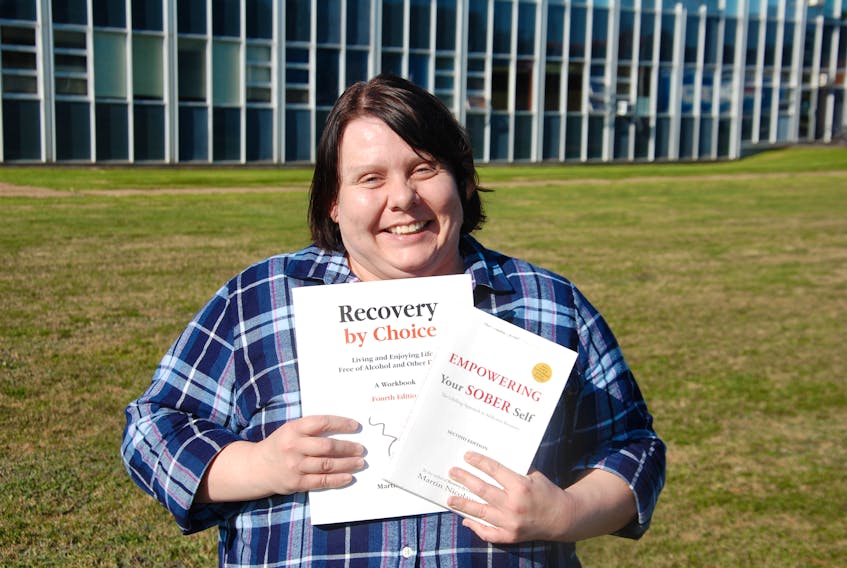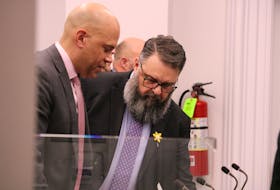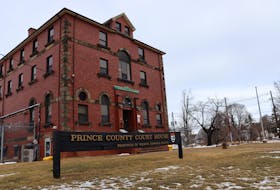CHARLOTTETOWN, P.E.I. - For Jocelyn Harnois, LifeRing is the most desired approach – and greatest shot – at lifelong sobriety.
Harnois, 37, of Charlottetown first learned of LifeRing Secular Recovery several years ago, but really latched on earlier this year to this organization of people who share practical experiences and sobriety support.
The philosophy of LifeRing, well, rings true to her beliefs, notably the emphasis placed on empowering the sober self.
“The three primary things with LifeRing are sobriety, secularity, and self-help,’’ explains Harnois, who is a government records archivist.
“So basically, we believe in abstinence, although certainly in the beginning it can be hard to maintain complete abstinence, but that’s the end goal.’’
Religion does not play a part in the meetings, but people of any or no religion are welcome.
“And self-help is the whole idea that we’re the ones with the power to make the change,’’ says Harnois.
“And yes, we may need help from others around us to do that, but we need to kind of take the reins and build a personal recovery plan as well. We all need to build a program that works for us.’’
“Self-help is the whole idea that we’re the ones with the power to make the change. And yes, we may need help from others around us to do that, but we need to kind of take the reins and build a personal recovery plan as well. We all need to build a program that works for us.’’
-Jocelyn Harnois
Harnois has been involved in online meetings with LifeRing since February but is eager to establish the movement in P.E.I.
She recently held her first LifeRing Secular Recovery Meeting. Only one person joined her at the meeting, but she is not easily deterred.
She has been told by people in the LifeRing community that starting a local movement can take time to find traction.
“I’m patient,’’ she says. “I will give it at least a year. I know it can take time.’’
Meetings will be held every Sunday from 6:30 to 7:30 p.m. in the first-floor meeting room of the Canadian Mental Health Association/P.E.I. Division building at 178 Fitzroy St.
Learn more
To learn more about LifeRing or the weekly secular recovery meetings in Charlottetown, contact Jocelyn Harnois by email at [email protected].
She urges people looking for an approach to sobriety that does not have a spiritual bent, but includes ongoing peer support, to give the meetings a try.
“It’s really helpful to sit in a room and brainstorm with other people who have been through it,’’ she says.
Harnois has been through plenty.
When she was in her early 20s attending university, she leaned heavily on alcohol to cope with change, stress and some trauma in her life.
She was drinking a good deal of booze every day and was getting physically sick.
Leaning on the bottle was a seven to eight year progression that really came to a head in her late 20s.
“I had pancreatitis,’’ she says. “I was not doing well mentally. I was barely putting on the appearance of at all of being OK at work.’’
She was a functional alcoholic for a long period, but eventually the cracks started to show. At the urging of her employer, Harnois sought help at the Provincial Treatment Centre in Mount Herbert.
“It wasn’t an easy road,’’ she recalls. “I did rehab. I drank straight out of rehab because it’s (alcohol addiction) just a very powerful thing.’’
She realized her life was on the line.
She ended up spending eight months at Lacey House, a 24-hour supervised therapeutic, safe, structured home-like environment that assists women in maintaining a chemical-free lifestyle.
“It just worked wonders,’’ she says. “It gave me time to stabilize myself and get established with connections in the recovery community.’’
At the time, the Alcoholics Anonymous 12-step program was the only option in town. She jumped in and is grateful for what she received.
However, AA was not quite the right fit for her.
“It was the spiritual aspect and the powerlessness aspect (of AA) – that’s not how I frame my recovery,’’ she says. “The whole handing it over works for a lot of people. To frame it in my mind to work I had to take control and I had to do the work and I needed a lot of help – both professionally and peer support – to get there. I didn’t do it by myself by any means.’’
When she found LifeRing, it was, she notes, a kind of “aha thing.’’
“It’s like the woman from Ireland in my online (LifeRing) meeting likes to say: ‘It’s not that life gets any better, it’s that we get better at coping with it’,’’ she says.
“And she is so right about that.’’









